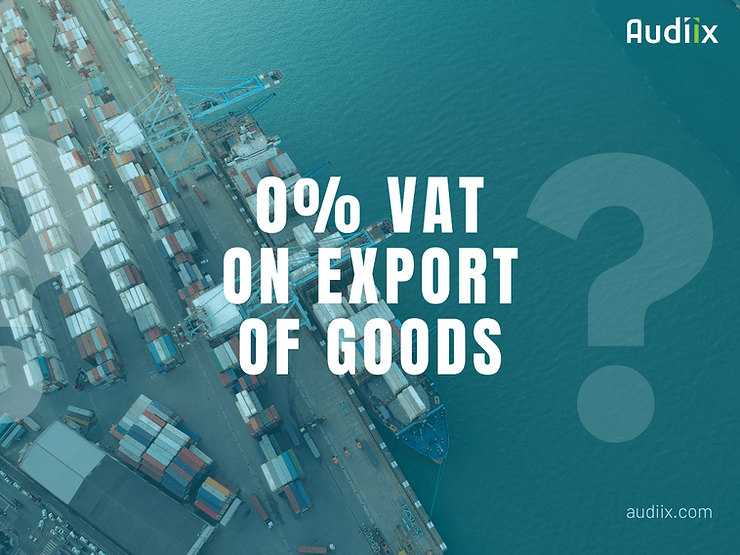VAT zero-rating on export of goods

The purpose of this article is to explain when exporters are eligible to charge a zero-rated VAT on export of goods from the UAE.
Reference to the UAE VAT regulations, export of goods from the UAE may be eligible for a zero-rated VAT. The conditions for zero-rating vary depending on the type of export.
Direct export
Direct export is where the supplier, or its appointed agent, is responsible for arranging the transport of goods from the UAE. In this case the export may be eligible for zero-rated VAT if the following conditions are met:
- The goods are physically exported outside the UAE or are put into a customs suspension regime in accordance with GCC Common Customs Law within 90 days of the date of the supply.
- Official and commercial evidence of export or customs suspension is retained by the exporter (including exit certificate and customs inspection).
Indirect export
Indirect export is where the “overseas customer”, or its appointed agent, is responsible for arranging the collection of the goods from the supplier in the UAE and then exporting the goods.
“Overseas Customer” is defined as a recipient of goods who does not have a place of establishment or fixed establishment in the UAE, does not reside in the UAE, and does not have a Tax Registration Number (“TRN”).
In this case the export may be eligible for zero-rated VAT if the following conditions are met:
- The goods are physically exported outside the UAE or are put into a customs suspension regime in accordance with GCC Common Customs Law within 90 days of the date of the supply under an arrangement agreed by the supplier and the overseas customer at or before the date of supply.
- The overseas customer obtains official and commercial evidence of export or customs suspension in accordance with GCC Common Customs Law and provides the supplier with a copy of this.
- The goods are not used or altered in the time between supply and export or customs suspension, except to the extent necessary to prepare the goods for export or customs suspension.
- The goods do not leave the UAE in the possession of a passenger or crew member of an aircraft or ship.
Evidence of export
A common condition for VAT zero-rating of exports is to obtain official and commercial evidence of export.
The purpose of the official and commercial evidence of export is to ensure that there is sufficient proof that the transaction has taken place and the goods have actually left the UAE.
Official evidence
Those are export documents issued by the local Emirate Customs Department confirming the exit of goods, in most Emirates, those are exit certificate or a similar document evidencing the export.
In practice, exit certificate is a must!
Exit certificate and customs inspection:
In practice, it has been observed that where a business is subject to tax audit or compliance check or applying for a VAT refund, the UAE Federal Tax Authority (FTA) normally requests exit certificate as an official proof of the export of goods. In the absence of exit certificate, the FTA rejects the application of zero-rate and considers it as an incorrect tax treatment.
On this premise, it is highly recommended that businesses obtain and retain exit certificates for all exports to which they apply zero rate. Failure to do so, will expose the business to risk of noncompliance including rejection of VAT refunds applications, late payment penalties, and imposition to pay 5% VAT on all reported exports without exit certificates which would be considered as not eligible for zero rating.
Commercial evidence
Commercial evidence provides proof of the transportation of the goods to outside the UAE.
Acceptable commercial evidence includes any of the following:
- Airway bill
- Bills of lading
- Consignment notes
- Certificate of shipments.
Both official and commercial evidence of export must identify the following:
- The supplier;
- The consignor;
- The goods;
- The value of the goods;
- The export destination; and
- The mode of transport and route of the export movement.
Where the conditions for zero-rating are not met, the supplier should account for VAT at the rate that would have been due on the supply if it was made locally in the UAE. i.e. 5% for standard rated supplies.
Administrative Exception
If the export evidence mentioned herein cannot be obtained, UAE businesses may apply to the FTA for an Administrative Exception to use alternative form of export evidence. Applicants must provide convincing reasons and circumstances for requesting an approval to allow the use of an alternative evidence, with a documentary proof to support the factual and legal grounds on which the request is based.
Download English
Download Arabic
Let’s talk
For a detailed discussion on various aspects of this article, please contact us.
[sc name=”disclaimer”][/sc]

